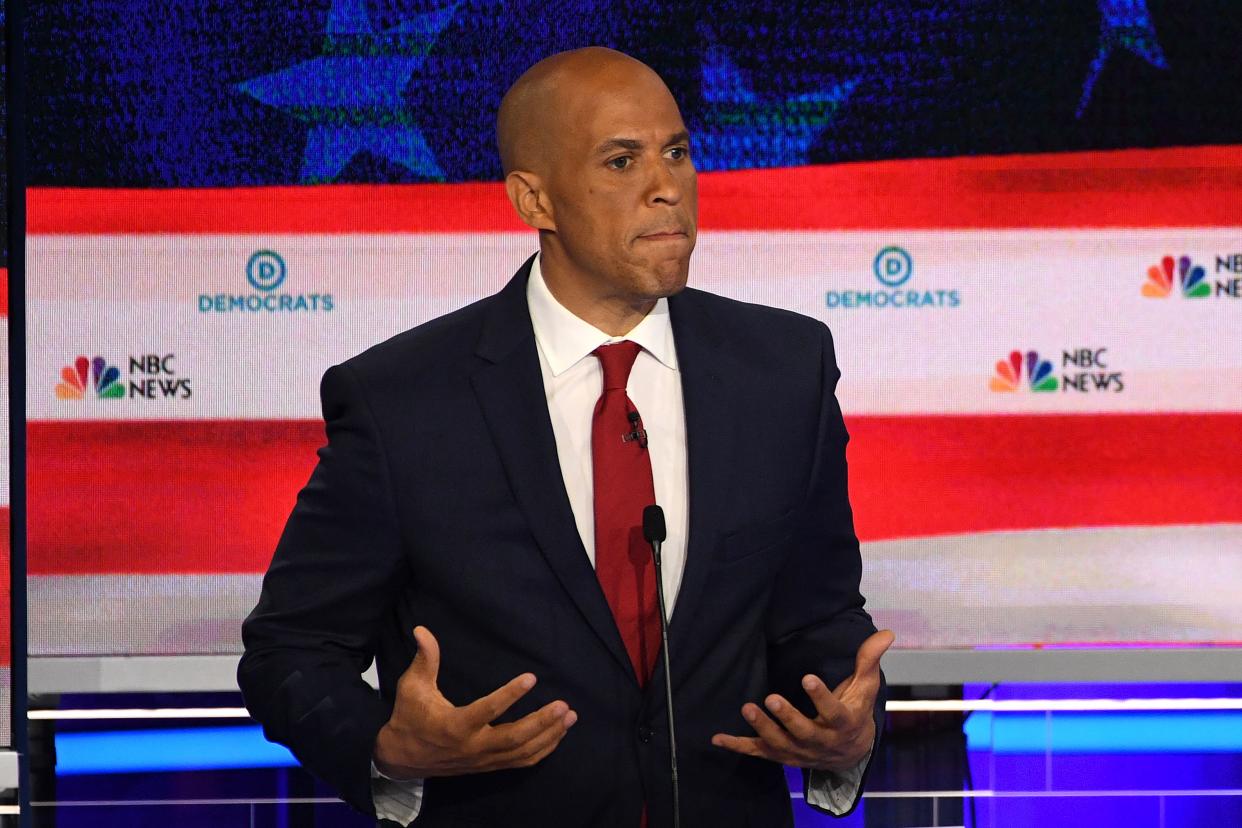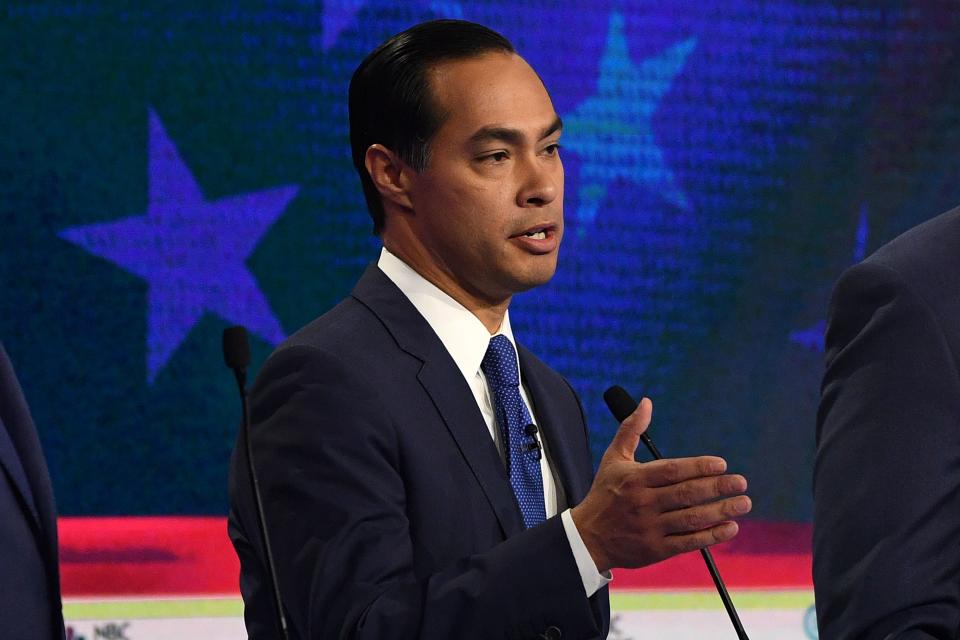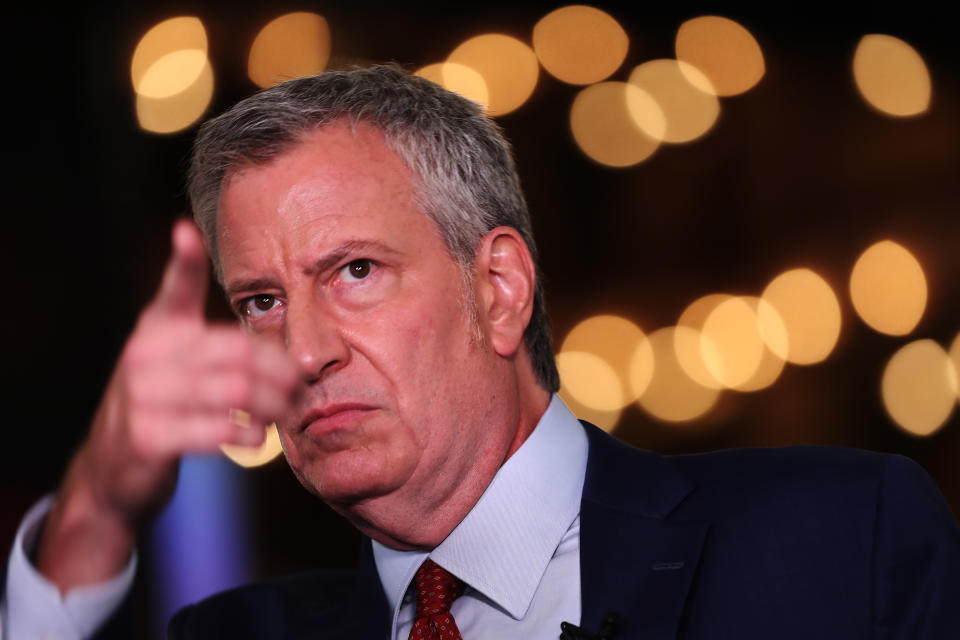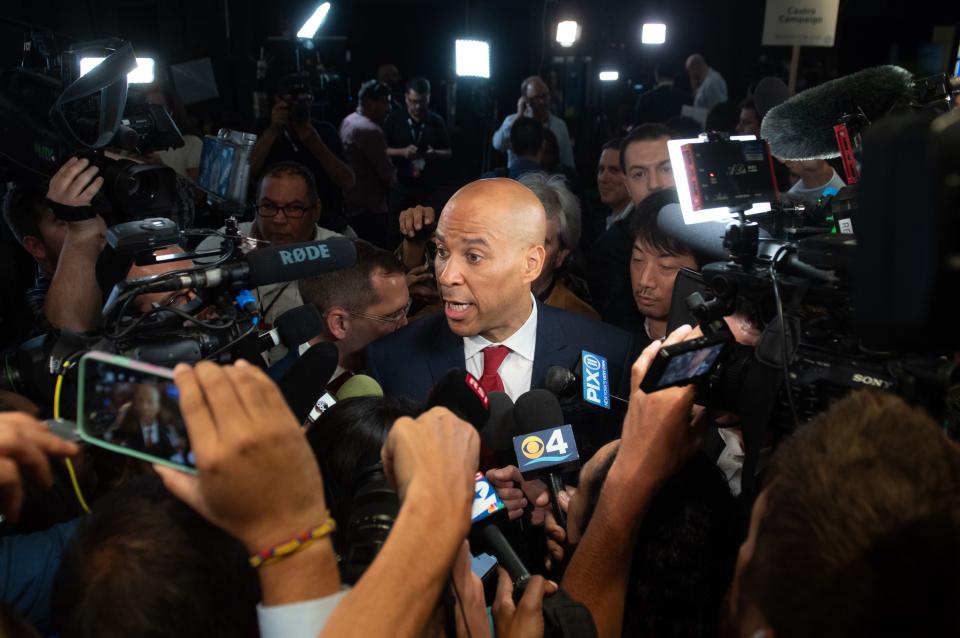For several of the Democratic underdogs, the first debate gave a much-needed boost

MIAMI — After Wednesday night’s Democratic presidential debate, senior members of New Jersey Sen. Cory Booker’s staff headed to a local bar where they celebrated until three in the morning.
Booker’s team had ample reason to celebrate. Prior to the debate, Booker had struggled to gain traction in the polls and his once bright political star seemed to be fading against the gravitational pull of frontrunners like former Vice President Joe Biden, Sen. Bernie Sanders and Sen. Elizabeth Warren.
For Booker, the night’s first breakout moment was a sideways glance at former Texas Rep. Beto O’Rourke, who responded in English and Spanish while dodging a question on tax rates. After that early meme-worthy exchange, the candidates tried to swipe one another on policy, while Booker, who stood close to center stage, took several opportunities to connect his policies to personal stories.
The leaders of the pack didn’t change on Wednesday night. Warren had a strong and steady performance that didn’t diminish her standing, and Biden and Sanders aren’t due to take the stage until the second debate Thursday evening.
But the surprise showing was from three candidates who had been polling in the single digits and getting limited media attention: Booker, former Secretary of Housing and Urban Development Julián Castro and New York City Mayor Bill de Blasio, came out of the debate with strong reviews, newfound swagger and some momentum.
For Booker, the debate gave him the opportunity to talk about his sweeping gun control plan, and emphasize that he’s the rare national politician who lives in a struggling inner city. “I think I’m the only one, I hope I am, that had seven people shot in their neighborhood just last week,” Booker said.
That strategy served him well, according to the New York Times, which said Booker topped the rest of his challengers with 11 minutes and 6 seconds of airtime, a coveted commodity so early in the primary season.
According to Google Trends, Booker was the most-searched candidate during the debate. When the candidates left the stage, Booker was mobbed in the “spin room” by reporters. A senior Booker campaign aide also said they had “huge fundraising” during the debate and the following day, and called it their “biggest moment of the campaign” since it launched in February.
“This is the moment where people were watching him for the first time of this campaign and they liked what they saw,” the senior aide said.

As the debate came to a close, the progressive activist group Indivisible conducted a flash poll of members asking who impressed most on the debate stage. Warren took first place, and Julián Castro, who served as Housing and Urban Development secretary under President Obama, got the second-place spot in the survey of activists. Booker scored a respectable third.
Castro, whose campaign had similarly struggled out of the gate, secured 8 minutes and 47 seconds of airtime, including a viral moment that also came at O’Rourke’s expense. Castro called out his fellow Texan for not supporting the repeal of Section 1325, which is the provision of U.S. law that makes it a federal offense to cross the border illegally.
“Some of us on this stage have called to end that section, to terminate it; some, like Congressman O'Rourke, have not,” Castro said on stage, gesturing directly to the former Representative. “And I want to challenge all of the candidates to do that. I just think it is a mistake, Beto, and I think if you truly want to change the system then we have to repeal that section.”
It was a breakthrough moment for Castro’s campaign, which has struggled to create a compelling narrative. Casting a clear opponent in O’Rourke, who was reportedly gun-shy and fielded post-debate criticism for answering the tax policy question in Spanish, created a clear runway for Castro to double-down on his progressive plan to decriminalize migration. Castro’s campaign manager, Maya Rupert, told Yahoo News she felt his debate performance was “a chance to show what this campaign is.”
“Exactly what I wanted to happen happened, and that is that people actually got to meet my boss,” Rupert said. “He’s not coming from an existing platform, he has lower name recognition than everyone, so when we go places when people actually get to see him, his message really resonates.”
Enthusiasm for Castro spilled over to the post-debate spin room, where he was mobbed by reporters while going from television appearance to television appearance. Rupert said she and her candidate were separated in the crush of attention. They reunited in the early hours of Thursday morning as they bought some late night snacks in a CVS. When they saw each other, the pair hugged in the aisles.

New York City Mayor Bill de Blasio also unexpectedly gained momentum in the debate. He entered the race last month with basement-level poll numbers and widespread head-scratching among politicos and pundits who questioned why he believed he could win with middling approval in his hometown.
On stage, de Blasio staked his claim as an unabashed progressive. He scored an early viral moment when he and Warren were the only candidates who raised their hands when moderators asked who would eliminate private health insurance as president. And de Blasio connected conversations about immigration and police reform to his personal story, citing his experiences as a father in an interracial family.
“For the last 21 years, I’ve been raising a black son in America,” de Blasio said, adding, “And I’ve had to have very, very serious talks with my son, Dante, about how to protect himself in the streets of our city ... including the fact that he has to take special caution because there have been too many tragedies between young men and our police.”
Headlines about the New York mayor did a 180 after the debate. Buzzfeed declared “Bill de Blasio … actually maybe knows what he’s doing.” Even the New York Daily News, which is part of the city press corps that has had a tortured relationship with de Blasio, said the night “proved he belongs on Democratic debate stage.”
De Blasio’s team came into the race confident that their candidate could overcome his doubters once he was viewed outside the lens of the New York City media. A senior de Blasio aide described the night as an opportunity for him to “highlight the need for a conversation about the heart and soul of the party” and “demonstrate to working people that Democrats will deliver results.”
“We know we have the best ideas,” the de Blasio aide said.

De Blasio, Booker and Castro emerged from the first debate in a stronger position than before, but it will take a lot to ride that new momentum to the front of the pack. All of their performances will surely be measured against the second debate Thursday night, which includes the two leaders in the polls, Biden and Sanders. Major moments from the more high-profile candidates could easily eclipse the first debate, and memories of their relatively strong performances may be short-lived.
“Cory did great last night, but we have to remember this is a marathon, not a sprint,” said one Booker campaign source. “The way we keep up the momentum is by doing what we are doing. Keep laying the groundwork in the early states, reaching out to voters who are just tuning in for the first time.”
A senior de Blasio adviser echoed that sentiment. “I think the night went about as well as it could have, but I was telling the team the debate doesn’t really end when the debate ends,” the adviser said. “It’s like what are you doing tomorrow morning?”
Read more from Yahoo News:

